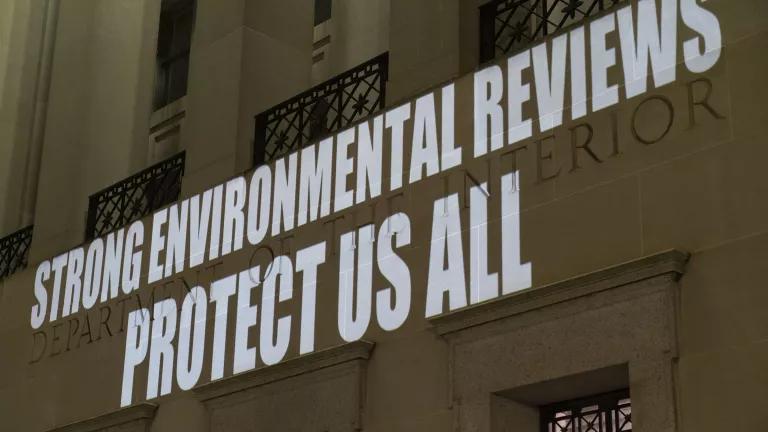Environmental Justice Health Alliance et al. v. Council on Environmental Quality et al. (NEPA Rule)
Case Status
ActiveLast Update

“Strong Environmental Reviews Protect Us All” is projected onto the exterior of the Department of the Interior (DOI) headquarters building by protestors in Washington, D.C., on February 25, 2020.
For half a century, the National Environmental Policy Act (NEPA) safeguarded the environment by ensuring that federal agencies consider the environmental impacts of their actions. The Trump administration attempted to manipulate that congressional mandate in July 2020, when the Council on Environmental Quality (CEQ) issued a rule that stripped NEPA of many long-standing protections for communities and the environment. The new rule requires federal agencies to stick their heads in the sand rather than taking a “hard look”—as required under NEPA doctrine—at the health and environmental consequences of their decisions.
Purporting to “streamline” the NEPA review process, CEQ’s new rule attempts to eliminate environmental review for many projects, curtail conflict-of-interest requirements, and erect massive barriers to public participation. The rule also eliminates the requirement to consider “cumulative” and “indirect” effects—considerations that courts have said, over and over again, must be taken into account. The new rule purports to require agencies to disregard individually minor impacts that, collectively, will devastate the environment. Removing cumulative impacts analyses from the scope of NEPA review makes it impossible for federal agencies to fairly and fully consider the effects of a project on environmental justice communities, as NEPA requires. And, if the rule is allowed to stand, projects may be approved without any examination of cumulative impacts that contribute to climate change or of indirect impacts like flooding or pollution. It takes little foresight to see how these changes will result in incomplete and biased environmental review—or, sometimes, none at all.
NEPA is a bedrock statute that protects frontline communities that are most impacted by environmental, socioeconomic, and racial inequities. Because a disproportionate number of projects occur in Black, Latino, or Indigenous communities, a robust NEPA process is fundamental to ensuring those communities are involved in decisions that directly affect their health and environment. The rule’s elimination of the requirement to consider cumulative effects, together with restrictions on public participation, will force frontline communities to continue shouldering inequitable environmental harms.
In response, on August 6, 2020, Environmental Justice Health Alliance, Center for Community Action and Environmental Justice, East Yard Communities for Environmental Justice, National Audubon Society, New Jersey Environmental Justice Alliance, New York Civil Liberties Union, NRDC, Sierra Club, and Texas Environmental Justice Advocacy Services filed suit to challenge this unlawful rollback of CEQ’s NEPA regulations.
Case Documents
Complaint (PDF)Related Content

To Defend NEPA, Coalition Takes Trump Administration to Court
